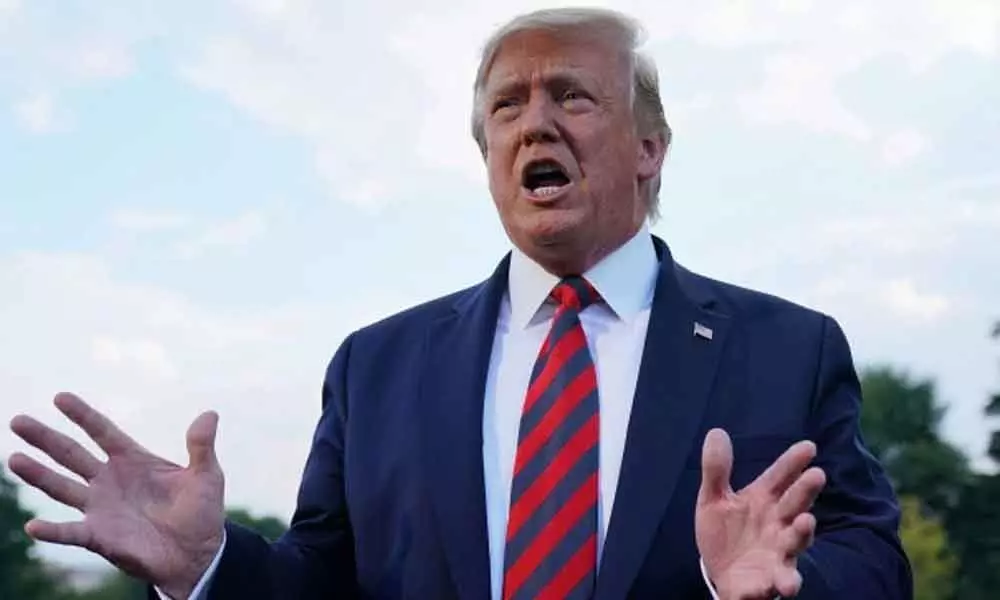Live
- Hit by Covid, MP's Rakesh Mishra sees revival of his fortunes, courtesy PM SVANidhi scheme
- Trailblazing Yakshagana Artiste Leelavathi Baipaditthaya No More
- Cong in direct fight with BJP on 45-50 seats in Delhi Assembly election: Sandeep Dikshit
- Vijay Diwas: Assam Rifles organises Half Marathon in Tripura
- Delhi HC to hear on Monday plea against suppression of CAG reports by CM Atishi
- Collaboration, innovation, PPP key to achieve 2047 goals: Jitendra Singh
- Portraits of National Leaders to be Unveiled in Karnataka Assembly Hall
- Kejriwal's claims on vision for development ridiculous: Delhi BJP
- One nation, one election need of the hour: Mukhtar Abbas Naqvi
- Educational Trips in South Kanara Put on Hold Following Murudeshwar Drowning Incident
Just In
Locked and loaded: Trump on Saudi's Aramco oil attack


Saudi Arabia has spent billions on military hardware but recent events have underscored the vulnerability of its infrastructure to attack.
Washington: President Donald Trump said Sunday the US is "locked and loaded" to respond to an attack on Saudi oil infrastructure that Washington has blamed on Iran, as Riyadh raced to restart operations at plants hit by drone attacks.
It is the first time the president has hinted at a potential American military response to the attack, which slashed Saudi oil production by half and led both the kingdom and the United States to announce they may tap their strategic reserves.
"Saudi Arabia oil supply was attacked. There is a reason to believe that we know the culprit, are locked and loaded depending on verification, but are waiting to hear from the Kingdom as to who they believe was the cause of this attack, and under what terms we would proceed!" Trump tweeted.
The Tehran-backed Huthi rebels in Yemen, where a Saudi-led coalition is bogged down in a five-year war, claimed Saturday's strikes on two plants owned by state energy giant Aramco.
But US Secretary of State Mike Pompeo pointed the finger squarely at Tehran, saying there was no evidence the "unprecedented attack on the world's energy supply" was launched from Yemen.
"The United States will work with our partners and allies to ensure that energy markets remain well supplied and Iran is held accountable for its aggression," the top US diplomat said. That drew an angry response from Tehran, where foreign ministry spokesman Abbas Mousavi said: "Such fruitless and blind accusations and remarks are incomprehensible and meaningless."
The remarks were designed to damage Iran's reputation and provide a pretext for "future actions" against the Islamic republic, he added. Baghdad, caught between its two main allies -- Tehran and Washington -- also denied any link to the attacks amid media speculation that the drones were launched from Iraq.
Saudi de facto ruler Crown Prince Mohammed bin Salman has said the kingdom is "willing and able" to respond to this "terrorist aggression." But a tit-for-tat strike on Iranian oil fields is "highly unlikely," Middle East expert James Dorsey told AFP.
"The Saudis do not want an open conflict with Iran. The Saudis would like others to fight that war, and the others are reluctant," said Dorsey, from the S. Rajaratnam School of International Studies in Singapore.
Instead, the kingdom focused on restoring production at the plants, as the Saudi bourse slumped three percent when the week's trading began on Sunday morning.
Saturday's explosions set off fires that engulfed the Abqaiq plant, the world's largest oil processing facility, and nearby Khurais, which hosts a massive oil field.
Saudi's energy infrastructure has been hit by the Huthis many times before, but this strike was of a different order, abruptly halting 5.7 million barrels per day (bpd) or about six percent of the world's oil supply.
"The genie is out of the bottle," said Bill Farren-Price, director of the London-based RS Energy Group. "It is now clear that Saudi and other Gulf oil facilities are vulnerable to this kind of attack, which means that the geopolitical risk premium for oil needs to rise."
No casualties were reported but the full extent of the damage was not clear, nor the type of weapons used, and reporters were kept away from the plants amid beefed-up security. Aramco also said it will dip into its reserves to offset the disruption.
On Saturday, CEO Amin Nasser said that "work is underway" to restore production, but the incident could affect investor confidence ahead of Aramco's stock market debut.
A significant volume of oil production can be restored within days but the company would need weeks to reach full output again, Bloomberg News reported Sunday, citing unnamed sources. Trump tweeted that he had "authorised the release of oil from the Strategic Petroleum Reserve, if needed, in a to-be-determined amount."
The president also "informed all appropriate agencies to expedite approvals of the oil pipelines currently in the permitting process in Texas and various other States," without naming specific projects.
Following a phone call between Trump and Prince Mohammed, the White House condemned the attacks on "infrastructure vital to the global economy."
Tehran and Washington have been at loggerheads since May last year, when Trump pulled the US out of a landmark 2015 deal with world powers that promised Iran relief from sanctions in return for curbs on its nuclear program.
Despite the US accusation, the White House said on Sunday Trump may still meet his Iranian counterpart Hassan Rouhani at the upcoming United Nations assembly. Saudi Arabia has spent billions on military hardware but recent events have underscored the vulnerability of its infrastructure to attack.
The Huthis have staged repeated cross-border missile and drone attacks targeting Saudi air bases and other facilities in what they say is retaliation for the Riyadh-led bombing campaign on rebel-held areas in Yemen.

© 2024 Hyderabad Media House Limited/The Hans India. All rights reserved. Powered by hocalwire.com






